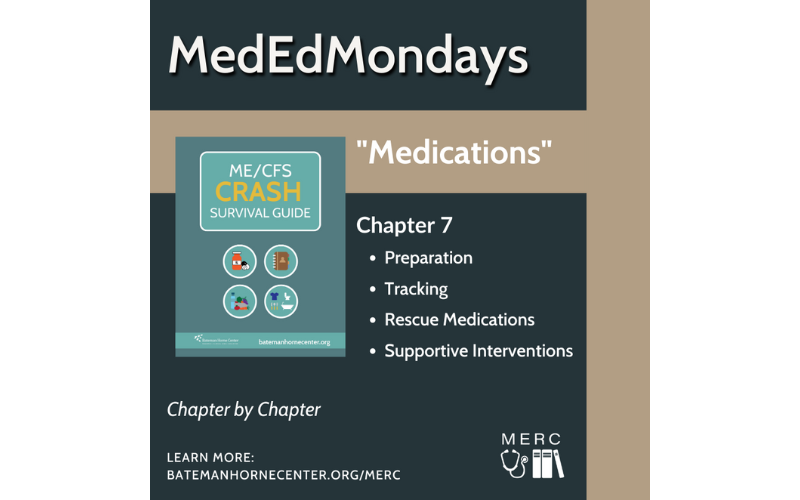This blog post covers the seventh chapter of the ME/CFS Crash Survival Guide. The information provided can also apply to individuals with Long COVID and other multi-system chronic complex illnesses that have a PEM component.
Click here to download the entire guidebook.
Chapter 7: Medication
Disclaimer: consult with your medical care team prior to introducing any new medication or supplement to your regimen. Ensure your provider is aware of your supplementation and is monitoring closely.
Brain fog can make it easy to forget your medication routine when you are experiencing PEM or moving into a crash. Delayed or missed medications can exacerbate a crash and/or slow your crash recovery.
- Make a list
- Utilize the downloadable medication lists in this guidebook or create your own.
- Include current medications with date, time you take it, reason for taking it, and the prescribing doctor.
- Be sure to include a list of the medications that you use PRN (as needed) or are considered your rescue medication during a crash (such as Zofran for nausea).
- Set medication alarms
- In the alarm description, label out what meds you are to take or add a prompt that will remind you to double-check the medications you are taking at that time.
- Double-check yourself
- Put colored labels or a sticker/marker stripe on med bottles based on when you take them during the day. Consider aligning these colors with your medication cards.
- Use pill containers that have day and time containers and pre-fill when not in a crash.
- Leave the pill flap open after you have taken those meds so you know where you left off.
- Consider mixing medications in pudding or yogurt to ease swallowing demands while also receiving some nutrients and coating an empty stomach (unless contraindicated).
Possible Rescue Meds and Supportive Interventions
Each patient’s crash and PEM recovery will be different and require an adaptable patient-specific approach. Work with your medical care team to establish the most appropriate interventions for you.
The following are not prescriptive for each patient, and only represent areas of consideration listed by symptom or physiologic driver.
Medications or supportive interventions to alleviate or minimize
- Body aches, nerve pain, headaches
- heating pads
- foot warmers
- ice packs/hats
- acetaminophen
- topical agents
- prescription meds
- Sleep disturbances
- melatonin
- sedating antihistamines
- supplements
- prescription medications
- Orthostatic intolerance
- oral fluids
- sodium and electrolyte packets
- IV fluids
- prescription medications
- Nausea, reflux, heartburn
- ginger
- peppermint
- anti-nausea agents
- antacids
- famotidine
- omeprazole
- prescription medications
- Diarrhea or constipation
- probiotics
- digestive enzymes
- Imodium
- stool softeners
- prescription medications
- Allergies, asthma, or mast cell activation syndrome (MCAS)
- low histamine diet
- antihistamines (H1 blockers)
- famotidine (H2 blocker)
- prescription medications
Note: many of these treatments are available over-the-counter, while others are prescriptive and require professional supervision or a written script from your provider.
This blog post covers the seventh chapter of the ME/CFS Crash Survival Guide.
Click here to download the entire guidebook.
The information provided can also apply to individuals with long COVID and other multi-system chronic complex illnesses that have a PEM component.
Bateman Horne Center relies on charitable contributions to produce
educational content such as the ME/CFS Crash Survival Guide.
Support our work by donating today!

 Lucinda Bateman, MD, is a renowned clinician, researcher, and educator. Her Johns Hopkins University Medical School training instilled an approach to care that she has employed throughout her career - the patient comes first and the unknown or unexplained does not equate to a lack of proper and compassionate care. Since starting her own practice in 2000, she has served on six boards or committees, been the principal investigator for 45 studies, authored/coauthored 40 journal articles, served as adjunct instructor and adjunct assistant professor in the University of Utah Departments of Preventative Medicine, Internal Medicine, and Anesthesiology, and lectured around the world.
Lucinda Bateman, MD, is a renowned clinician, researcher, and educator. Her Johns Hopkins University Medical School training instilled an approach to care that she has employed throughout her career - the patient comes first and the unknown or unexplained does not equate to a lack of proper and compassionate care. Since starting her own practice in 2000, she has served on six boards or committees, been the principal investigator for 45 studies, authored/coauthored 40 journal articles, served as adjunct instructor and adjunct assistant professor in the University of Utah Departments of Preventative Medicine, Internal Medicine, and Anesthesiology, and lectured around the world.